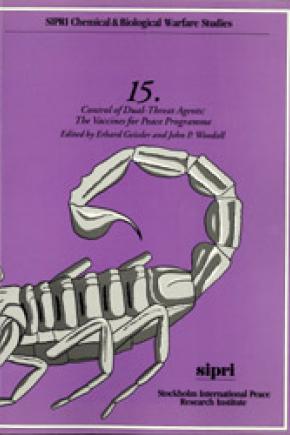Control of Dual-threat Agents: The Vaccines for Peace Programme
The Vaccines for Peace (VFP) programme is designed to counter reservations about the military misuse of research into vaccines. It focuses on vaccines developed to combat those pathogens and toxins which can be used as weapon agents. In this book a range of experts from fields as diverse as biotechnology, vaccinology, international law, and diplomacy discuss the VFP programme.
Contents
Part I. Introduction
1. Introduction (Erhard Geissler and John P. Woodall)
2. The Vaccines for Peace programme: Executive summary (Erhard Geissler and John P. Woodall)
3. Arms control, health care and technology transfer under the Vaccines for Peace programme (Erhard Geissler)
Part II. Strengthening the Biological Weapons Convention
4. The missing link in implementation of the BWC: The war against pathogens (Félix C. Calderón)
5. Vaccines for Peace: A political scientist's critique (Oliver Thränert)
6. Control and co-operation in biological defence research: national programmes and international accountability (Nicholas A. Sims)
7. Verification of the BWC (Tibor Tóth, Erhard Geissler and Thomas Stock)
8. The conversion of biological warfare research and development facilities to peaceful uses (Milton Leitenberg)
Part III. Vaccine R&D and production
9. Viral vaccines: Their evolution and current trends (Florian Horaud)
10. Human viral vaccines (Nizar Ajjan, Pierre Saliou and Louis Valette)
11. Viral vaccine research, development and production in the former Soviet Union: A brief review of the situation (Sergey G. Drozdov)
12. The Scientific and Production Association Vector: The current situation (Sergey V. Netesov)
13. Vaccines against dual-threat agents: Regulation and quality, issues and constraints (Jack Melling)
Part IV. Public health and biological defence
14. Vaccines for biological defence: Defence considerations (Graham S. Pearson)
15. Molecular aspects of the activity and design of antiviral agents (Peter Langen)
16. Vaccines for public health: Can Vaccines for Peace help in the war against disease? (Stephen S. Morse)
17. The Global Epidemiological Surveillance System and Vaccines for Peace: Complementary initiatives in public health and weapon control (Mark L. Wheelis)
Part V. International programmes for prevention of disease
18. The WHO global smallpox eradication programme: Vaccine supply and variola virus stocks (Frank Fenner)
19. Options for the development and transfer of vaccine technology (Devaguptapu Subrahmanyam)
20. Funding and managing international programmes in biosciences and health care (John P. Woodall)
Part VI. Final discussion
21. From BVI to VFP: Towards a system of global biological security (Erhard Geissler, Félix C. Calderón and John P. Woodall)
Part VII. Annexes
Annexe A. The 1972 Biological Weapons Convention
Annexe B. Final Declaration of the Third Review Conference of the BWC
Annexe C. The Biesenthal Vaccine Initiative (Vaccines for Peace) Biesenthal Consensus
Annexe D. The Biesenthal Vaccine Initiative Mission Statement
Annexe E. Mission Statement of the Federation of American Scientists (FAS) Project on the Global Control of Emerging Infectious Diseases
Annexe F. US House of Representatives Resolution H.R. 5241
About the editors
Dr Erhard Geissler is Professor of Genetics and Head of the Bioethical Research Group, Max Delbrück Centre for Molecular Medicine, Berlin-Buch. A biologist by training, he has done research in the fields of biophysics, microbial genetics, and tumour virology. He has also published extensively on the subjects of biological weapons, the social impact of genetics and other biosciences, and the responsibility of scientists, and has convened several symposia on these questions. He edited Biological and Toxin Weapons Today (1986) and Strengthening the Biological Weapons Convention by Confidence-Building Measures (1990), No 10 in the SIPRI Chemical & Biological Warfare Studies.
Dr John P. Woodhall, an epidemiologist and virologist, was leader of the World Health Organization's observer delegations to the Third Review Conference of the Biological Weapons Convention (BWC) and the four meetings of the Ad Hoc Group of Governmental Experts to Identify and Examine Potential Verification Measures from a Scientific and Technical Standpoint in 1992-93. He is also on the Steering Committees of the Biesenthal Vaccine Initiative and of the Global Program for Monitoring Emerging Diseases, another initiative connected with strengthening the BWC. He has been published in earlier volumes of this series and in other journals on the epidemiology of agents relevant to the BWC.
SIPRI Chemical & Biological Warfare Studies is a series of studies intended primarily for specialists in the field of CBW arms control and for people engaged in other areas of international relations or security affairs whose work could benefit from a deeper understanding of particular CBW matters.
This book can be ordered from all good bookshops and online booksellers or directly from OUP
OUP in the UK:
http://www.oup.com/uk/catalogue/?ci=9780198291725 (paperback)
OUP in the USA:
http://www.us.oup.com/us/catalog/general/?view=usa&ci=9780198291725 (paperback)

